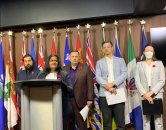How Alberta could get more power and autonomy — without leaving Canada

Alberta has legal and constitutional pathways to seizing more power for itself within Confederation, argues a new paper from the Macdonald-Laurier Institute, but the province would need to demonstrate that it can responsibly govern itself and its citizens, the author says.
“We’re not even managing — fully and responsibly managing — areas that are within our jurisdiction of the Constitution as it’s written today,” Michael Rupert Binnion said in an interview. “And yet, we’ve got people talking about, ‘Oh, we’re going to do more.'”
The paper, entitled How the West Wins: Alberta’s legal pathway to greater power within Canada, was written by Binnion, the executive director of the Modern Miracle Network, a resource-industry advocacy group. Binnion is also serving on the Alberta Next panel, the province-wide touring panel convened by Alberta Premier Danielle Smith to decide what steps the province might take to insulate itself from political decision-making in Ottawa. The panel recently wrapped up its consultations and is now producing a report for the Alberta government.
“Canada’s constitutional evolution and judicial precedents offer a clear roadmap for Alberta, or any like-minded province, which seeks to lawfully pursue greater autonomy,” Binnion argues in his research brief.
The paper suggests that Alberta can take control of a number of areas of governance — policies that have been debated hotly within the province for more than two decades, dating back to at least the Firewall Letter written in 2001 by Stephen Harper, before he was prime minister, and several other major conservative thinkers.
They include creating an Alberta pension plan and an Alberta police force, and taking more control over the immigration system and taxation powers, as Quebec has done — powers that are already available to the province under the Constitution.
“What I would say is completely different is the context and tone,” said Binnion.
The point of the paper is not to argue for Alberta taking on more powers to “build a fortress and protect ourselves,” as many others have argued, but rather to become a more “grown-up province,” and reap subsequent benefits of that additional power.
“Why wouldn’t we be building the institutional capacity to govern ourselves better and more responsibly as well?” said Binnion.
The paper suggests that in recent decades, the federal government has exercised more and more control over provincial affairs via environmental legislation and transfer payments that indirectly control provincial policy, such as in the case of health care and universal daycare.
Binnion argues that in addition to the areas where Alberta can immediately take control under the constitution, the demonstration of “responsible governance” could be used as a tool to push for further constitutional reform or autonomy for the province or any other province, too. It also posits that Alberta could reshape Indigenous relations within the country, perhaps by moving to have treaty relationships and responsibilities transferred from the federal government to the province.
“If Alberta leads with legitimacy, not defiance, it can reshape the country from within, forging a stronger, more balanced Canada where provincial sovereignty is not only respected, but revitalized,” Binnion writes.
At present, Binnion said he doesn’t believe Alberta has demonstrated it’s got the institutional capacity to self-govern in the manner that Quebec does. He pointed to the example of the provincial government’s proposal to build a homegrown Alberta pension plan and exit the Canada Pension Plan (CPP). Two-thirds of Albertans are opposed to that idea, and would rather their pensions be managed under the CPP.
“That shows a fairly low level of trust here, right?” said Binnion.
The solution to this would be to slowly start building up provincial capacity and responsibility — taking over the provincial portion of responsibility for immigration or taxation, for example. In Quebec, it took “two generations that they put into building up these institutions and building the confidence of the population in those institutions,” and as a result, the province has more influence within confederation.
Binnion is no separatist, and is not arguing for secession, but notes that Quebec has enough provincial self-government developed that if the province decided to leave Canada, it actually could.
“We have the capability to grow up and be a big province and not be having a tantrum about not being treated fairly,” Binnion said about Alberta. “If we did that, we would find that our leverage on federal issues would be bigger and better, and probably we would have more respect in the federation.”
Our website is the place for the latest breaking news, exclusive scoops, longreads and provocative commentary. Please bookmark nationalpost.com and sign up for our politics newsletter, First Reading, here.




Comments
Be the first to comment